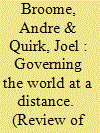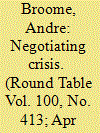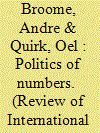|
|
|
Sort Order |
|
|
|
Items / Page
|
|
|
|
|
|
|
| Srl | Item |
| 1 |
ID:
142232


|
|
|
|
|
| Summary/Abstract |
Benchmarking practices have rapidly diffused throughout the globe in recent years. This can be traced to their popularity amongst non-state actors, such as civil society organisations and corporate actors, as well as states and international organisations (IOs). Benchmarks serve to both ‘neutralise’ and ‘universalise’ a range of overlapping normative values and agendas, including freedom of speech, democracy, human development, environmental protection, poverty alleviation, ‘modern’ statehood, and ‘free’ markets. The proliferation of global benchmarks in these key areas amounts to a comprehensive normative vision regarding what various types of transnational actors should look like, what they should value, and how they should behave. While individual benchmarks routinely differ in terms of scope and application, they all share a common foundation, with normative values and agendas being translated into numerical representations through simplification and extrapolation, commensuration, reification, and symbolic judgements. We argue that the power of benchmarks chiefly stems from their capacity to create the appearance of authoritative expertise on the basis of forms of quantification and numerical representation. This politics of numbers paves the way for the exercise of various forms of indirect power, or ‘governance at a distance’, for the purposes of either status quo legitimation or political reform.
|
|
|
|
|
|
|
|
|
|
|
|
|
|
|
|
| 2 |
ID:
081295


|
|
|
|
|
| Publication |
2008.
|
| Summary/Abstract |
The International Monetary Fund (IMF) is an organization charged with the responsibility to observe governance experiments to enhance institutional competitiveness in its member states. While the IMF's role in propagating certain forms of institutional competitiveness in developing economies is commonly discussed, less emphasis has been placed on how the IMF seeks to transfer policy knowledge, and to learn from, the governance of institutional competitiveness in its developed Western member states. This article provides a corrective by providing an analysis of IMF staff and Executive Board advice on taxation and monetary reform to two 'coordinated' market economies, Denmark and Sweden, and two 'liberal' market economies, Australia and New Zealand, from 1975 to 2004. The article traces how IMF staff and Executive Board advice compares with actual changes to taxation and monetary regimes in these four small open economies. In sum, this article explores the notion that the IMF is an 'experimentalist governance' organization that seeks to build its comparative knowledge of policy reform, providing a contrast with the common depiction of the IMF as an institution that dictates 'neoliberal' policy homogeneity
|
|
|
|
|
|
|
|
|
|
|
|
|
|
|
|
| 3 |
ID:
094024


|
|
|
|
|
| Publication |
2010.
|
| Summary/Abstract |
The International Monetary Fund (IMF) has become one of the most controversial international institutions in history. The IMF's crisis management responsibilities expanded via its involvement with a series of international economic crises during the last three decades, which led to widespread calls for radical reform of the organisation in the aftermath of the emerging market crises of the 1990s. This article examines the IMF's initial response to managing the effects of the global credit crunch, focusing on the new round of large IMF loans approved in late 2008 and early 2009, to assess how much IMF lending policies have changed in practice compared with earlier international crisis episodes. While the organisation has continued to promote conventional loan policy targets aimed at achieving low inflation, low budget deficits, and sustainable public debt, the preliminary evidence also suggests the IMF is developing a more flexible approach to crisis management in borrowing member states. Changes include a greater tolerance for unorthodox policies such as short-term capital controls, greater differentiation in the treatment of borrowers based on their economic circumstances, easier access to precautionary IMF financing for prime borrowers, and more flexibility in the use of loan conditionality.
|
|
|
|
|
|
|
|
|
|
|
|
|
|
|
|
| 4 |
ID:
103859


|
|
|
|
|
| Publication |
2011.
|
| Summary/Abstract |
How do small states use international organisations to manage the consequences of exogenous shocks? This article examines this question through exploring how small states negotiate with the International Monetary Fund (IMF) for crisis management support during a period of 'disaster capitalism'. Focusing on the case of Iceland, the article argues that while small states can potentially build scale economies in specialist sectors such as banking, the risks inherent in rapid financial expansion greatly increase their vulnerability to external shocks. In such circumstances, small states are likely to struggle to level the playing field in their attempts to negotiate the constraints and opportunities provided by engagement with the IMF during international crises, when they face higher stakes compared with larger economies and have a narrower policy choice set at their disposal.
|
|
|
|
|
|
|
|
|
|
|
|
|
|
|
|
| 5 |
ID:
142231


|
|
|
|
|
| Summary/Abstract |
Global benchmarks have grown exponentially over the last two decades, having been both applied to and developed by states, international organisations, corporations, and non-governmental organisations. As a consequence, global benchmarking is now firmly established as a distinct mode of transnational governance. Benchmarking chiefly involves the development of comparative metrics of performance, which typically take the form of highly stylised comparisons which are generated by translating complex phenomena into numerical values via simplification and extrapolation, commensuration, reification, and symbolic judgements. This process of translation takes what might otherwise be highly contentious normative agendas and converts them into formats that gain credibility through rhetorical claims to neutral and technocratic assessment. This politics of numbers has far-reaching ramifications for transnational governance, including the dimensions and effects of indirect power, expertise and agenda-setting, coordination, regulation and certification, and norm contestation and activism. This Special Issue draws upon an emerging literature to explore how and why benchmarks both align with and expand upon established models of International Relations theory and scholarship. It does so by critically examining the role of global benchmarks in key areas such as state ‘failure’, global supply chains, disaster management, economic governance, corporate social responsibility, and human development.
|
|
|
|
|
|
|
|
|
|
|
|
|
|
|
|
|
|
|
|
|